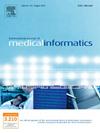Exploring the importance of clinical and sociodemographic factors on self-rated health in midlife: A cross-sectional study using machine learning
IF 3.7
2区 医学
Q2 COMPUTER SCIENCE, INFORMATION SYSTEMS
International Journal of Medical Informatics
Pub Date : 2025-02-10
DOI:10.1016/j.ijmedinf.2025.105834
引用次数: 0
Abstract
Background
Self-rated health (SRH) is influenced by various factors, including clinical and sociodemographic characteristics. However, in the context of Brazil, we still lack a clear understanding of the relative importance of these factors and how they differ between men and women in midlife. Given the significance of gender equity in health, it is crucial to explore these differences to meet the specific needs of each group.
Objective
This study examines the importance of clinical and sociodemographic factors of SRH among middle-aged Brazilian adults and analyzes how they vary between men and women.
Methods
A cross-sectional analysis was conducted using data from the 2019 National Health Survey (PNS) with a representative sample of 31,926 middle-aged adults (40–59 years) living in private households on Brazilian territory. Five machine learning models—Naive Bayes, SVM, Logistic Regression, Random Forests, and XGBoost—were employed to analyze the data.
Results
The analysis revealed gender-specific patterns in SRH predictors. For men, education was the most critical factor, followed by diagnoses of physical and mental illnesses. For women, SRH was primarily influenced by chronic disease diagnoses, low education, and health insurance coverage. Alcohol consumption was a stronger predictor of poor SRH for men than women, likely due to cultural norms that promote higher alcohol use among men.
Conclusion
This study provides insights into midlife health disparities, emphasizing gender-specific factors influencing SRH. Machine learning demonstrated its value in uncovering nuanced patterns in health data, offering a powerful tool for public health research and policy.
求助全文
约1分钟内获得全文
求助全文
来源期刊

International Journal of Medical Informatics
医学-计算机:信息系统
CiteScore
8.90
自引率
4.10%
发文量
217
审稿时长
42 days
期刊介绍:
International Journal of Medical Informatics provides an international medium for dissemination of original results and interpretative reviews concerning the field of medical informatics. The Journal emphasizes the evaluation of systems in healthcare settings.
The scope of journal covers:
Information systems, including national or international registration systems, hospital information systems, departmental and/or physician''s office systems, document handling systems, electronic medical record systems, standardization, systems integration etc.;
Computer-aided medical decision support systems using heuristic, algorithmic and/or statistical methods as exemplified in decision theory, protocol development, artificial intelligence, etc.
Educational computer based programs pertaining to medical informatics or medicine in general;
Organizational, economic, social, clinical impact, ethical and cost-benefit aspects of IT applications in health care.
 求助内容:
求助内容: 应助结果提醒方式:
应助结果提醒方式:


